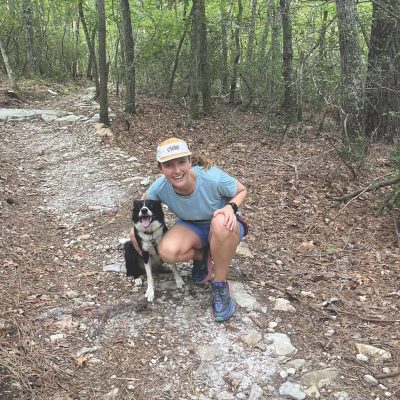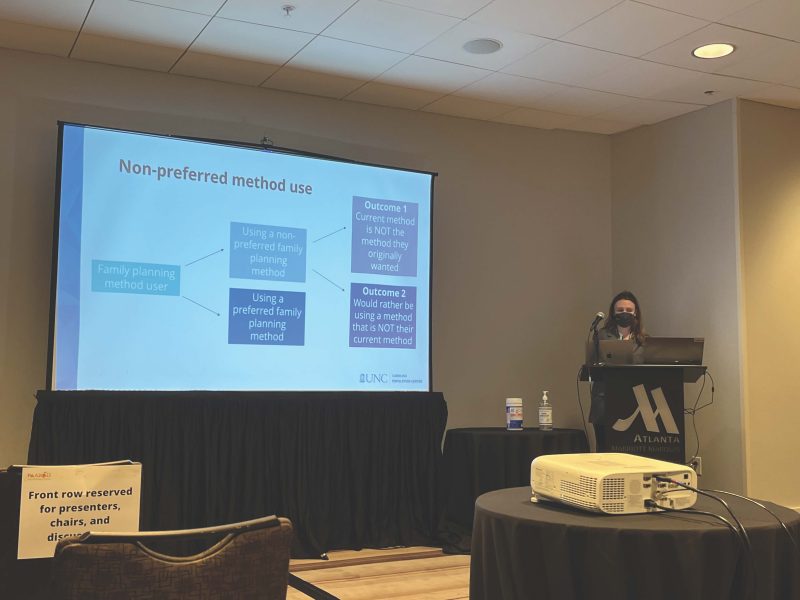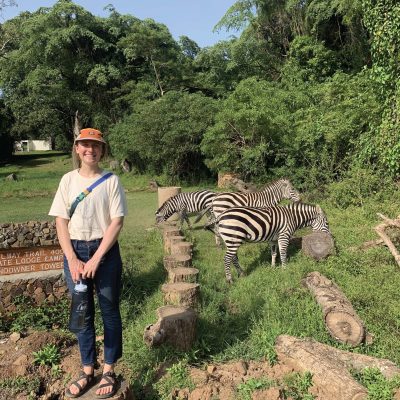Q&A with Brooke Bullington, PhD Student in the Department of Epidemiology
What was your background before enrolling in the PhD program at Gillings?

Brooke Bullington
For undergrad, I studied math, sociology, and computer science at Bowdoin College in Maine. At Bowdoin, I took a class called Reproductive Health and Politics taught by Dr. Nancy Riley that really blew my mind about how we think about “choice” in reproductive health decision-making. I knew I wanted to find a way to combine my interest in sociology and reproductive health with my math and CS skills, which is how I found public health research.
After graduating, I worked for two years at the Center for Global Health at Weill Cornell Medicine with Dr. Jennifer Downs. My work at Cornell was based in the Mwanza region of Tanzania and fell into two camps: one focused on the parasitic disease schistosomiasis and its association with HIV in women and the other focused on family planning. My favorite part of my job was leading a discrete choice experiment that examined community preferences for family planning education. I worked on the project from start to finish, from planning the data collection tools to writing up the final manuscript.
Will you tell us about your experience as a trainee at the Carolina Population Center?
My traineeship at the Carolina Population Center (CPC) has been a wonderful opportunity to learn from students and faculty across UNC. The field of global family planning is inherently interdisciplinary, so I am grateful to have gained cross-cutting training that draws from the fields of sociology, demography, epidemiology, and health behavior. As part of my traineeship, I have taken coursework, attended seminars, and conducted research practicums that are intellectually engaging and give me the skills to help push my work forward. I love working with my co-preceptors for my traineeship, Drs. Audrey Pettifor and Kat Tumlinson, who have helped me craft my training to fit my specific interests and goals.
Some of the highlights of my traineeship so far include presenting at the Population Association of America annual conference on use of non-preferred family planning methods among reproductive-aged women in Burkina Faso and traveling to Kenya last summer to assist with enumerator training and data collection as part of Dr. Tumlinson’s R01 grant focused on social accountability interventions to improve quality of contraceptive care.

Brooke presenting her work at the Population Association of America’s 2022 annual conference in Atlanta
What excites you most about your current research on reproductive health/ family planning, or the field in general?
So much! I am passionate about reproductive autonomy, so my work focuses on ensuring that all people have the opportunity to make informed, full, and free choices about their contraceptive use and realize their reproductive desires. I am fortunate to be working closely with folks who prioritize autonomy in contraceptive research, including Dr. Leigh Senderowicz of University of Wisconsin-Madison and Dr. Kavita Shah Arora, an OBGYN at UNC School of Medicine.
There is lots of work to be done around measurement in the field of family planning, specifically related to autonomy and quality of care. I spend a lot of time thinking about what we are measuring now, what we should be measuring, and what we should be asking to make sure we are accurately capturing people’s experiences. I have two forthcoming papers with Drs. Senderowicz and Tumlinson that are specifically about measurement, one of a novel indicator of contraceptive autonomy and another examining a commonly employed indicator, unmet need for family planning.
As an epidemiologist, I’m interested in applying causal inference methods to global family planning research. I’m excited to be doing that as part of my dissertation, which examines autonomy in intrauterine device (IUD) uptake and removal in Tanzania and Nepal. This will be one of the first times I will get to apply the advanced methods I learned in my epi coursework to answer questions related to reproductive autonomy.
What does “global health” mean to you?
To me, global health is complex. In my work, I try to grapple with the legacies of colonialism, eugenics, and population control that inform many global family planning programs that exist today. This means doing a lot of cross-disciplinary reading and thinking, rooted in history and theory, to make sure my research is informed by the work of many scholars in the social sciences who have been grappling with these legacies for years. I believe centering reproductive justice and autonomy in global reproductive health research is imperative to push the field forward, and I’m excited to see the field moving in that direction.
What has been a highlight of your time at Gillings?

From a May 2022 trip to Kisumu, Kenya to assist with data collection for Dr. Kat Tumlinson’s R01
Undoubtedly the people. I am fortunate to have a group of mentors from the Departments of Epidemiology, Maternal and Child Health, and Obstetrics & Gynecology at UNC School of Medicine that care deeply about the work and are invested in my success. Not only do they ensure that I have ample opportunities to conduct research that’s important to me, but they center my wellbeing outside of school and work. I feel really supported by my peers and mentors, which has been instrumental in making my way through grad school.
I am also grateful for the professors in the Department of Epidemiology. I’ve had the opportunity to learn cutting-edge epidemiologic methods from some of the leaders in the field. I’ve enjoyed thinking through ways to combine my interest in epi methods and global family planning; I am grateful for faculty’s insights and thoughtfulness as I’ve navigated that process.
When not studying or working, how do you like to spend your free time?
My favorite activity is trail running in Carolina North Forest with my partner and our dog, Bernie. Generally, I love being outside in any and all capacities. Recently I’ve been enjoying battling it out on the pickleball court with Clara and Kyle Busse (fellow Gillings students).
